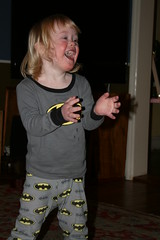A few years back I was a regular blogger about the Roe v. Wade anniversary. As it turns out, the last post I wrote about Roe v. Wade was in 2008. That would be a blog post I wrote while I was already pregnant with Maybelle but wasn’t publicly announcing it. I was intentionally, happily pregnant, and I was still adamantly in favor of women’s reproductive rights. This is an important thing to recognize.
I’ve obviously had a lot of other stuff going on since then. I’ve been blogging a lot about parenthood, and about disability rights. But this year I’d like to return to the old tradition and write a post offering a shout out to women’s reproductive freedom.
As I’ve always said, a woman’s control over her own reproduction affects every aspect of her life. Every aspect. So I maintain now, as I always have, that we must give women the right to end a pregnancy if they don’t want to be pregnant, and the pregnant women themselves are the ones who get to decide why they don’t want to be pregnant. It’s not a decision that other folks should have a legal right to weigh in on.
I also want to say that I’ve been pretty powerfully influenced by readings I’ve been doing about reproductive justice. When feminists talk about reproductive rights, generally they’re talking–as I am here–about the right to have an abortion. And this is hugely important. But reproductive justice expands that concept. Scholar Kimala Price explains that the reproductive justice movement’s “three core values are: the right to have an abortion, the right to have children, and the right to parent those children.” If we really want women to have control over their reproduction, that doesn’t just mean that they get to choose not to be pregnant. It also means that they get to choose to have and parent children.
Here’s another great quote from Dorothy Roberts in Killing the Black Body (please note that if you’re in my capstone course, this is the book we’re discussing on Thursday):
Reproductive liberty must encompass more than the protection of an individual woman’s choice to end her pregnancy. It must encompass the full range of procreative activities, including the ability to bear a child, and it must acknowledge that we make reproductive decisions within a social context, including inequalities of wealth and power. Reproductive freedom is a matter of social justice, not individual choice.
Why is this particularly important to me these days? Because I’m doing research on prenatal testing, and we know that when a person has prenatal testing and learns that the fetus has Down syndrome, 90% of those fetuses are terminated. And we all know that when 90% of a group is doing something, it’s no longer a matter of simple “choice.” As Roberts notes in the quotes above, we’re not simply individuals in a bubble, with 90% randomly choosing termination. “We make reproductive decisions within a social context,” and our social context tends to tell us that kids with Down syndrome are no good. Defective product. Best to get rid of that fetus and start over.
 Biffle and I didn’t decide to get rid of that fetus, and we’re incredibly glad about that.
Biffle and I didn’t decide to get rid of that fetus, and we’re incredibly glad about that.
I’m adamant that we–and all other potential parents–should have the right to terminate any pregnancy that’s unwanted. My ability to choose not to be pregnant is as important now as it’s ever been in my life, if not moreso.
But I also see it as part of my reproductive activism to change the social context that would identify my daughter as a defective product (and the word “defective” is often used in descriptions of Down syndrome, trust me–that’s not me being hyperbolic). I want to change the inaccurate perceptions of Down syndrome that not only affect people’s decisions while pregnant, but that affect the options available to folks who are here in the world: school inclusion, for instance, college possibilities, media representations, availability of jobs.
Is it a stretch to say that programs like REACH are connected to my reproductive justice activism? Maybe a tiny stretch, but only tiny, because if I’d known while I was pregnant that I was soon going to be teaching people with Down syndrome in my college classes, that would have immediately challenged the stereotypes of Down syndrome that were frolicking unnoticed in my mind.
Perhaps I would have had a clue that the thing that’s really challenging is parenting. The hardest things for me about being a parent have nothing at all to do with Down syndrome. Learning ASL so that Maybelle can communicate earlier? Easy and fun! Dealing with a person in your house who says “NO!” to every single question you ask? Challenging (and developmentally appropriate)!
Alright, so hurray for Roe v. Wade. People who can get pregnant don’t have full humanity unless they have the right to control their own bodies. And hurray for reproductive justice, which reminds us that reproduction is a far larger issue than abortion, an issue that urges us to make the world a place worth living in.
The end. (Cross-posted at Baxter Sez.)


Comments
Rambling Wee Lassie — January 24, 2012
Its interesting you that looked at this subject, when this weekends paper in the UK had an article saying they were going to let abortion clinics advertise on tv. I believe that women have the right to choose, but felt uncomfortable with this. What do you think?
Elline — January 26, 2012
Alison, Great to have this moving and deeply meaningful post on the anniversary. And love the picture of Maybelle.